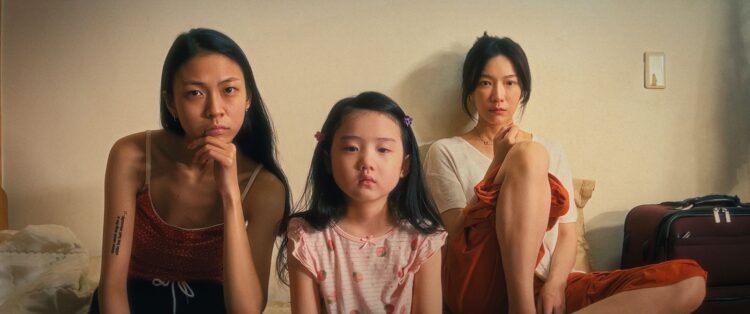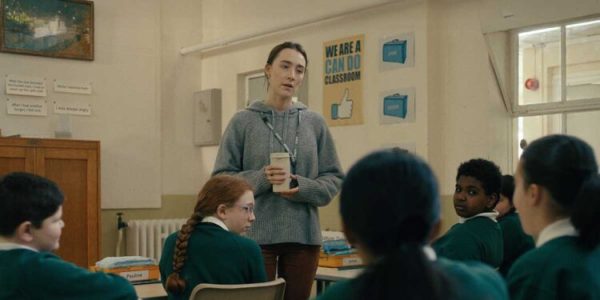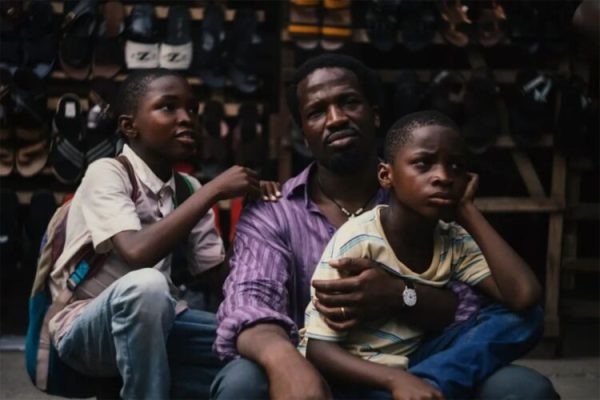
The neon-lit alleyways of Taipei’s night markets have never looked quite so vivid as they do through a child’s eyes. Shot on an iPhone to emphasize the sheer wonderment of a five-year-old’s POV, where every mundane backstreet is filled with endless possibility for a young protagonist who has left the countryside for the first time, director Shih-Ching Tsou’s solo debut Left-Handed Girl is a simple but striking drama about growing up in a family living paycheck-to-paycheck. Its visual sensibility and child’s-eye view of near-poverty naturally brings to mind co-writer Sean Baker’s The Florida Project, which Tsou produced, but this isn’t a tale of life on the margins so much as it is about those who have narrowly made it out of them, every rent increase or unexpected life expense threatening to push them back.
After moving to the city as the film opens, we move ahead to when mother Chu-Fen (Janel Tsai) has her noodle stall in the night market up and running, although things are less smooth at home. Older teenage daughter I-Ann (Shih-Yua Ma) is acting up, sleeping with her boss and frequently getting into arguments with her mother, who she’s furious is covering the costs of her ex-husband’s funeral, as he has nobody else to do so––nobody else is willing to bail her out and help with the rent, either, after years of asking family for help. Little I-Jing (Nina Ye) has her own crisis after her grandfather insists she stop using her left hand to write and eat, as it belongs to the devil. After briefly contemplating cutting it off, later tying it up to force herself to use her right hand, she throws in the towel and begins shoplifting, blaming the “devil hand” for her misbehavior.
Although it lends a title and I-Jing’s central narrative obstacle, the crisis of left-handedness is not the driving force of this film, although it is a key facet in an exploration of a culture still stuck in its misogynist ways. Both I-Jing’s mom and sister are in opposition to the aging patriarch, who can’t hide his delight whenever he gets to look after his granddaughter while the rest of the family isn’t there, so he won’t have any pushback to his attempts to get her to stop relying on her devil hand. It’s this aspect of the narrative most rooted in folkloric tradition––although a throwaway line reveals that many of I-Ann’s former classmates changed their names for superstitious reasons, believing this would help them pass university entrance exams––but the other arcs within the family drama similarly delve into the specific obstacles faced by women, up to and including the normalized misogyny from elderly female family members, who don’t make it a secret that the sons are the most cherished members of their families.
As much as the younger women will tell I-Jing that certain traditions and behaviors are dying out, not reflective of contemporary society, people within the mom and older sister’s peer groups will still look down on them for not conforming to society’s expectations. How this pertains to a financially unstable single mom is self-explanatory, but for a daughter who has only recently entered adulthood, the way she’s perceived as a failure by secondary characters is telling. For example: after telling her married boss she’s pregnant with his child when quitting the job, purely as an excuse to humiliate him in front of his girlfriend, we later hear that same girlfriend tell I-Ann that she can keep the baby if it’s a girl; if it’s a son, she’s taking it, as she’s owed the prosperity finally having a son will bring. Being a woman isn’t enough on its own to have you immediately written off in this world––but if you’re not thriving and stable by a young age, or have a male heir who can help bring you that respectability, it will be an uphill battle.
The film takes a sudden sharp left turn into melodrama in its final act, with a tense confrontation at a family gathering Tsou has said is a direct lift from Mike Leigh’s Secrets & Lies. It hinges on a previously unaired family secret forcing itself out in the open, but with a noted lack of foreshadowing, it plays out like the director didn’t have quite know how to end the drama––a shame, considering that if this underlying tension had been integrated properly, it would have added a richer dimension to the family dynamics instead of feeling like an unearned climactic twist. It’s one of the sequences that dips in and out of the child’s POV and would likely work better if told entirely from that perspective, making dramatic sense as to why we’re suddenly hearing something which has only been murmured offscreen. The sequence itself is well-staged and performed, with Tsou sharing Baker’s talent in directing exceptional performances from young and non-professional actors, but nevertheless feels clumsy in inclusion for its sheer abruptness––a gut punch that might leave you more confused than devastated.
It’s especially jarring for how lived-in the rest of Left-Handed Girl feels, the family dynamics beautifully realized until the director aims to shatter everything we know about them. It’s not enough to diminish the rest of the film, but it does suggest a sequence written with Tsou’s right hand rather than her left.
Left-Handed Girl screened at BFI London Film Festival and opens in theaters on November 14 and arrives on Netflix on November 28.
The post BFI London Review: Left-Handed Girl is a Striking Drama Told Through a Child’s Eyes first appeared on The Film Stage.



